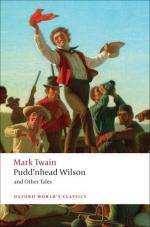But they were angry, and would hear of no compromise. They were well acquainted with the President of the Boston and Albany, they said, and would put everything aside next day and go up to Boston and fix that boy.
The Major said he would be on hand too, and would do what he could to save the boy. One of the gentlemen looked him over and said:
’Apparently it is going to be a matter of who can wield the most influence with the President. Do you know Mr. Bliss personally?’
The Major said, with composure:
‘Yes; he is my uncle.’
The effect was satisfactory. There was an awkward silence for a minute or more; then the hedging and the half-confessions of over-haste and exaggerated resentment began, and soon everything was smooth and friendly and sociable, and it was resolved to drop the matter and leave the boy’s bread and butter unmolested.
It turned out as I had expected: the President of the road was not the Major’s uncle at all—except by adoption, and for this day and train only.
We got into no episodes on the return journey. Probably it was because we took a night train and slept all the way.
We left New York Saturday night by the Pennsylvania road. After breakfast the next morning we went into the parlour-car, but found it a dull place and dreary. There were but few people in it and nothing going on. Then we went into the little smoking compartment of the same car and found three gentlemen in there. Two of them were grumbling over one of the rules of the road—a rule which forbade card-playing on the trains on Sunday. They had started an innocent game of high-low-jack and had been stopped. The Major was interested. He said to the third gentleman:
‘Did you object to the game?’
’Not at all. I am a Yale professor and a religious man, but my prejudices are not extensive.’
Then the Major said to the others:
’You are at perfect liberty to resume your game, gentlemen; no one here objects.’
One of them declined the risk, but the other one said he would like to begin again if the Major would join him. So they spread an overcoat over their knees and the game proceeded. Pretty soon the parlour-car conductor arrived, and said, brusquely:
’There, there, gentlemen, that won’t do. Put up the cards—it’s not allowed.’
The Major was shuffling. He continued to shuffle, and said:
‘By whose order is it forbidden?’
‘It’s my order. I forbid it.’
The dealing began. The Major asked:
‘Did you invent the idea?’
‘What idea?’
‘The idea of forbidding card-playing on Sunday.’
‘No—of course not.’
‘Who did?’
‘The company.’
‘Then it isn’t your order, after all, but the company’s. Is that it?’
’Yes. But you don’t stop playing! I have to require you to stop playing immediately.’




